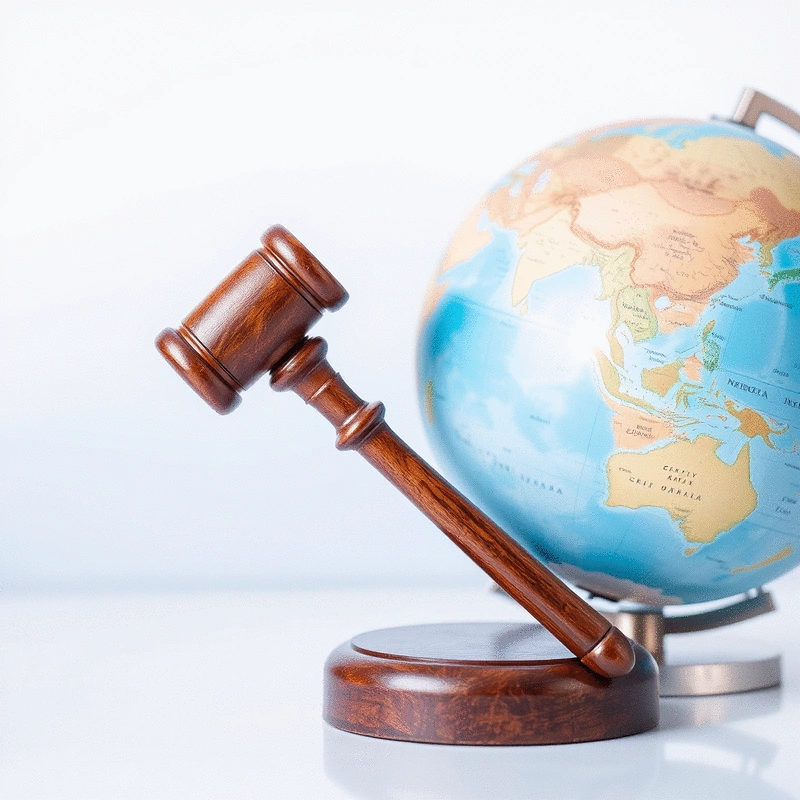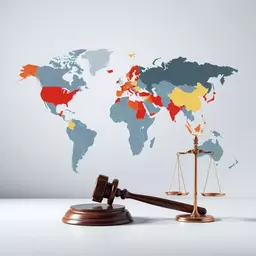International Treaties and Extradition

Extradition serves as a vital mechanism in the global pursuit of justice, yet many remain unaware of the intricacies involved. As we delve into the international treaties that underpin this process, one must consider the profound implications these agreements hold for legal cooperation across borders. Understanding these dynamics is crucial for anyone involved in or affected by extradition cases.
What You Will Learn
- The role of international treaties: Treaties establish a standardized framework for nations, ensuring clearer guidelines and mutual cooperation in extradition cases.
- Specialty principle explained: This principle dictates that individuals can only be tried for crimes specified in the extradition request, protecting their rights from additional charges.
- Understanding dual criminality: Extradition can only occur when the act in question is recognized as a crime in both the requesting and requested countries, protecting individuals from unjust extradition.
- Non-extradition of nationals: Most countries prioritize their own citizens' rights against extradition, but exceptions may exist, particularly in serious criminal cases.
- International organizations' impact: Organizations like the United Nations and Interpol enhance extradition processes through cooperation, training, and established protocols.
- Future considerations for treaties: As modern crimes evolve, treaties must adapt, incorporating new legal standards and utilizing technology for improved processes.
- Recommendations for effective cooperation: Regular treaty reviews, training for legal professionals, and fostering dialogue among countries can significantly enhance the extradition process.
The Impact of International Treaties on Extradition Processes
This visual illustrates the key benefits of international treaties in the extradition process, highlighting their significance in ensuring legal clarity, mutual recognition, and protection of rights. For more detailed insights into specific legal frameworks, consider reading about extradition laws in the UAE.
Legal Clarity
Treaties provide clear guidelines on the extradition process, minimizing misunderstandings.
Mutual Recognition
Nations recognize each other's legal systems, enhancing cooperation.
Protection of Rights
Treaties often include provisions to safeguard the rights of the accused.
Key Legal Principles
Understanding principles like dual criminality and specialty is essential in extradition.
Understanding the Extradition Process Through International Treaties
Extradition is a vital aspect of international law, functioning as a bridge between nations in the pursuit of justice. At Extradition Interpol UAE, we explore how international treaties govern this complex process, ensuring that justice transcends borders. Treaties establish the legal framework through which countries cooperate in extraditing individuals accused of crimes, making them essential in the realm of extradition law.
The Importance of International Treaties in Extradition Cases
International treaties play a crucial role in shaping extradition cases across the globe. These agreements create a standardized system for nations to interact, outlining the obligations and procedures for extradition. With treaties in place, countries can ensure mutual trust and cooperation, which are essential when dealing with cross-border criminal cases.
Some key benefits of international treaties include:
- Legal Clarity: Treaties provide clear guidelines on the extradition process, minimizing misunderstandings.
- Mutual Recognition: Nations recognize each other's legal systems, enhancing cooperation.
- Protection of Rights: Treaties often include provisions to safeguard the rights of the accused.
Key Legal Principles Governing Extradition
Understanding the fundamental legal principles governing extradition is essential. These principles help ensure that the extradition process is fair and just. Two critical concepts in this domain are the specialty principle and dual criminality. Navigating these complexities often requires specialized legal guidance, such as that offered by criminal defense lawyers in Dubai.
Defining the Specialty Principle in Extradition Treaties
The specialty principle is a foundational doctrine in extradition law that dictates that a person extradited can only be tried for the crimes specified in the extradition request. This principle serves to protect the rights of the accused, ensuring they are not subjected to prosecution for additional offenses that were not part of the original request.
To illustrate, if a person is extradited for theft, they cannot be charged with a different crime, such as fraud, unless the extraditing country agrees to it. This principle not only upholds justice but also builds trust in the extradition process.
Understanding Dual Criminality in Extradition
Dual criminality is another critical requirement in extradition cases. It stipulates that the act for which extradition is sought must be a crime in both the requesting and requested countries. This principle ensures that extradition is only pursued when there is a shared understanding of what constitutes a criminal act.
For example, if a person is accused of an offense that is legal in one country, they cannot be extradited for that act to another country where it is illegal. This requirement protects individuals from facing extradition for actions that are not recognized as crimes in their own country!
Non-Extradition of Nationals: Legal Obligations and Exceptions
Most countries have legal provisions that prohibit the extradition of their own nationals. This principle is rooted in a nation’s duty to protect its citizens and ensure that they receive justice within their own legal system. However, exceptions may exist, allowing for extradition under specific circumstances, such as treaties that permit this action.
Some key points regarding the non-extradition of nationals include:
- Countries generally prioritize their citizens' rights in extradition situations.
- International treaties may offer exceptions, allowing for extradition in serious criminal cases.
- Understanding these obligations is crucial for individuals facing extradition requests.
International Legal Framework Governing Extradition
The international legal framework for extradition includes various laws and treaties that provide the structure for extradition processes. Significant instruments include the Extradition Act and the Mutual Legal Assistance Treaty (MLAT), which facilitate cooperation between nations.
These legal frameworks ensure that the extradition process is conducted fairly and efficiently. They also underscore the importance of international collaboration in combating transnational crime, aligning with our mission at Extradition Interpol UAE to empower individuals navigating these complexities.
The Role of Major International Organizations
International organizations, such as the United Nations and Interpol, play a pivotal role in facilitating extradition processes. They promote cooperation among member states and provide mechanisms for sharing information and resources.
Key contributions of these organizations include:
- Establishing protocols for extradition requests.
- Providing training and resources to legal professionals.
- Enhancing communication between nations to expedite extradition processes.
By understanding the roles of these organizations, individuals can better navigate the extradition landscape, ensuring their rights are upheld throughout the process. This is particularly relevant when dealing with complex issues such as responding to an Interpol Red Notice.
Pro Tip
When dealing with extradition cases, it's crucial to engage legal counsel familiar with both the requesting and requested countries' laws. This specialized knowledge can significantly impact the outcome of your case, ensuring that all legal avenues are explored and rights are protected.
Summarizing the Role of International Treaties in Extradition
As we wrap up our discussion on international treaties and their role in the extradition process, it's crucial to recognize how these agreements shape legal cooperation across borders. Treaties serve as the backbone of extradition laws, providing a framework that facilitates requests and establishes mutual trust among nations. In our ever-evolving legal landscape, adapting these treaties to contemporary challenges is essential for effective international collaboration.
The future of extradition treaties is not just about maintaining the status quo. As I reflect on the insights I've gathered through my work at Extradition Interpol UAE, I see the need for flexibility and responsiveness in our legal systems. This adaptability will ensure that treaties remain relevant and effective in addressing new types of crimes and global security threats.
The Future of Extradition Treaties in an Evolving Legal Landscape
Looking ahead, the landscape of extradition treaties must evolve alongside the challenges presented by modern criminal activities. With the rise of cybercrime and global terrorism, our legal frameworks need to be more dynamic. Here are some considerations for the future:
- Incorporating New Legal Standards: As society changes, so must our laws. Treaties should reflect current legal standards and practices.
- Strengthening Multilateral Cooperation: Countries can benefit from working together on a larger scale, enhancing efficiency in extradition processes.
- Utilizing Technology: Embracing technology can streamline communication and documentation during extradition requests.
My experience has shown that without proactive measures to adapt treaties, we may face significant barriers in the extradition process. For individuals navigating these challenges, understanding the evolving nature of these agreements can empower them to better prepare their defense strategies.
Recommendations for Enhanced International Cooperation
To foster a more effective extradition process, I recommend several strategies that can enhance international cooperation in this realm. These suggestions are crucial for ensuring that treaties serve their intended purpose efficiently:
- Regular Treaty Review: Nations should commit to periodic assessments of their treaties to address any weaknesses or outdated provisions.
- Training and Capacity Building: Providing training for legal professionals and law enforcement on extradition laws can improve understanding and execution of these processes.
- Encouraging Dialogue: Facilitate open discussions among countries about best practices and potential reforms in extradition agreements.
At Extradition Interpol UAE, we aim to be a part of this dialogue, offering insights and resources that can assist individuals and legal professionals alike in understanding and navigating extradition laws.
Addressing Common Questions about Extradition and Treaties
As we conclude, let’s address some frequently asked questions regarding extradition procedures and treaties. These common inquiries can offer clarity on the subject:
- What is the role of treaties in extradition? Treaties establish the legal basis for extradition and outline the obligations of involved countries.
- Can a person contest an extradition request? Yes, individuals have the right to challenge extradition requests based on various legal grounds.
- Do all countries have extradition treaties? No, not all countries have extradition treaties with each other, which can complicate extradition processes.
By addressing these common questions, we hope to demystify the extradition process and empower individuals to seek the assistance they need.
Frequently Asked Questions (FAQs) about Extradition Treaties
- What is the primary purpose of international treaties in extradition?
International treaties establish a standardized legal framework for nations to cooperate in extraditing individuals accused of crimes, ensuring legal clarity, mutual recognition of legal systems, and protection of rights. - What is the "specialty principle" in extradition law?
The specialty principle dictates that an extradited individual can only be tried for the specific crimes listed in the extradition request, preventing prosecution for additional, unlisted offenses. - How does "dual criminality" affect extradition?
Dual criminality requires that the act for which extradition is sought must be considered a crime in both the requesting and requested countries. If it's not a crime in both, extradition cannot proceed. - Can a country refuse to extradite its own citizens?
Yes, most countries have legal provisions prohibiting the extradition of their own nationals. However, exceptions can exist, particularly if specified in international treaties for serious criminal cases. - What role do organizations like Interpol play in extradition?
Organizations like Interpol facilitate international cooperation by establishing protocols for extradition requests, providing training and resources to legal professionals, and enhancing communication between nations to expedite the process. - How are extradition treaties adapting to modern crimes?
Extradition treaties are evolving to address modern challenges such as cybercrime and global terrorism by incorporating new legal standards, strengthening multilateral cooperation, and utilizing technology to streamline processes.
Final Insights on Treaty Compliance and Enforcement Challenges
Finally, it's important to recognize that treaty compliance and enforcement challenges can significantly impact the extradition landscape. Compliance issues may arise from:
- Political Considerations: Changes in political climates can affect countries' willingness to comply with treaty obligations.
- Legal Discrepancies: Variations in legal systems may lead to differing interpretations of treaty provisions.
- Resource Limitations: Some nations may lack the resources to effectively engage in extradition processes, leading to delays.
By understanding these challenges, individuals can be better prepared when facing extradition requests. At Extradition Interpol UAE, we are committed to providing insights and resources to help navigate these complex legal waters. Together, we can work towards a more efficient and equitable extradition process for all involved. For strategies and approaches to these complex situations, you might find our article on challenging extradition: key strategies insightful.
Recap of Key Points
Here is a quick recap of the important points discussed in the article:
- Role of International Treaties: Treaties provide the legal framework for extradition, ensuring cooperation and mutual trust between nations.
- Legal Principles: Key concepts like the specialty principle and dual criminality are essential for fair extradition processes, protecting the rights of the accused.
- Non-Extradition of Nationals: Most countries prioritize the protection of their citizens, with some exceptions based on specific treaty provisions.
- International Collaboration: Organizations like the UN and Interpol facilitate information sharing and cooperation in extradition cases.
- Future Considerations: The landscape of extradition treaties must evolve to address modern challenges such as cybercrime and global terrorism.
- Recommendations for Improvement: Regular treaty reviews, training for legal professionals, and open dialogue among nations can enhance the effectiveness of extradition processes.



